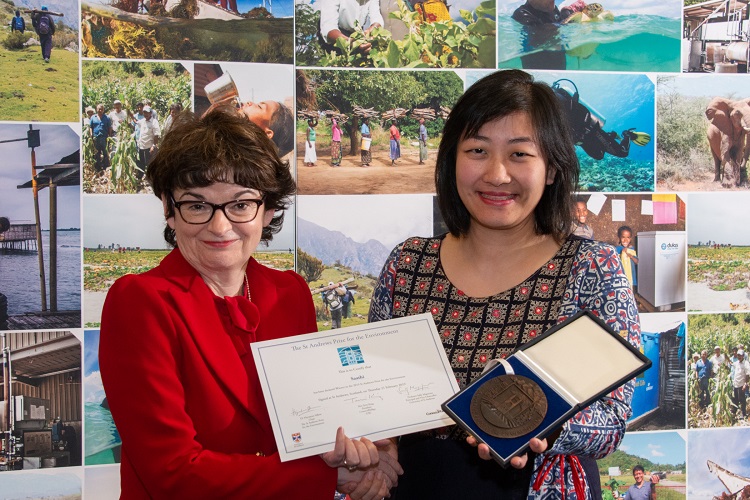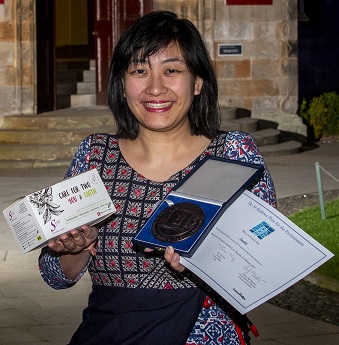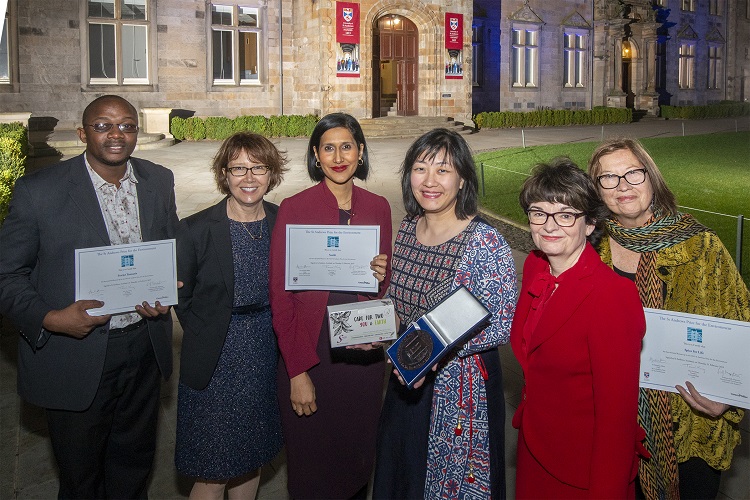Saathi wins 21st St Andrews Prize for the Environment

A project which produces eco-friendly, 100% biodegradable and compostable sanitary pads in the state of Gujarat, India has won the St Andrews Prize for the Environment 2019.
Saathi has developed a sanitary product that is biodegradable and compostable, using agricultural waste from banana tree farmers as a raw material. The Saathi pads enable girls and women in rural Jharkhand to have access to clean, biodegradable menstruation products.
At a ceremony at the University of St Andrews last night, Kristin Kagetsu from Saathi was presented with the winning prize of US$100,000. She says: “It’s an honour to be selected first as a finalist and ultimately as a winner for this prestigious prize.

“It’s one of the few prizes that focuses on the environment and has a long history of amazing projects from around the world. Winning this prize will help us get more international recognition, raise awareness about improving feminine hygiene in India and reduce harmful waste created by sanitary pads. The prize money will also give us a significant boost in being able to scale up and purchase new machinery to be able to increase our capacity and reach 30 times more women.”
Celebrating its 21st award in 2019, the Prize is an environmental initiative by the University of St Andrews in Scotland and independent exploration and production company, ConocoPhillips. The award recognises significant contributions to environmental issues and concerns with a focus on sustainability, conservation, biodiversity and community development.
Since its launch in 1998, the Prize has attracted more than 5600 entries from around the world and donated more than US$2 million to environmental initiatives. These projects have addressed the diverse topics of sustainable development, food security, urban re-generation, recycling, health, water and waste issues, renewable energy, community education and more. Ideas submitted have been global, local and/or scalable and they outline how they will socially and economically impact the communities where they are based.
Dr Hayaatun Sillem, Chair of the St Andrews Prize for the Environment Trustees and Chief Executive of the Royal Academy of Engineering, says: “I am honoured to have taken on the role of Chair of Trustees for the St Andrews Prize for the Environment from Lord Alec Broers, and I feel immensely privileged to be involved in such an uplifting process.
“This was another excellent year for the Prize with an incredibly varied range of projects, led by teams who all show great commitment and passion, addressing social and environmental challenges as diverse as deforestation, access to clean water, plastic waste and renewable energy. I would like to congratulate this year’s winner, Saathi, who really impressed us with their dual focus on people and planet and who are addressing an extremely important need with a commendably inclusive approach.”
This year’s runners-ups, each presented with a cheque for US$25,000 were:
Spice for Life – Hope for Madagascar’s Rainforests
Planting sustainable, high-value forest crops within existing forests to help restore Madagascar’s ecosystem: Centre ValBio’s initiative, Securing and Protecting Investments & Capacity for Environmental Sustainability (SPICES), seeks to protect Madagascar’s ecosystems through conservation science. The project explores how human landscapes can continue to sustain biodiversity whilst ensuring continued support to local resource needs.
EcoAct-Tanzania – Preventing Ocean Pollution and Deforestation
Transforming plastic waste and packaging into durable, long-lasting plastic timber, replacing the use of wood timber: EcoAct-Tanzania aims to address the challenges of post-consumer plastic pollution, waste management, deforestation and climate change. It has developed a plastic extrusion technology called ‘Waxy ӀӀ technology’ which recycles and transforms plastic waste into durable plastic timbers, providing an alternative to wood timbers.
Professor Sally Mapstone, Principal and Vice-Chancellor of the University of St Andrews, says: “This is the 21st anniversary of a Prize that has spearheaded innovation and shown what academia, industry and our enterprising partners across the world can do to create a more sustainable way of life by working together.
“The success of the St Andrews Prize for the Environment is a product of the University’s longstanding partnership with ConocoPhillips and is an example of how collaboration can change lives for the better. The University of St Andrews is home to world-leading research on environmental issues and this year we will open a new home for the Scottish Oceans Institute so that work to protect marine environments can be advanced. I congratulate this year’s winners, Saathi, who are both innovative and inspirational, and I look forward to seeing their impact grow.”
Terri King, President UK for ConocoPhillips, says: “Twenty-one years ago, ConocoPhillips chose to partner with the University of St Andrews in the creation of the St Andrews Prize for the Environment. Back then, we were unsure where the initiative would lead us, but we are extremely proud to have been part of the Prize legacy throughout its journey of innovation and discovery.

“This year’s finalist projects are all helping to tackle some the biggest environmental problems that our planet faces today. Their work in support of reforestation efforts, minimising land usage and promoting biodegradability and plastics re-use all play a vital role in helping to preserve the earth for future generations. Congratulations to Saathi for winning the 21st Prize. I shall follow your progress with interest.”
Visit the St Andrews Prize for the Environment website for a full list of previous winners and details about the Prize. You can also follow the Prize on Facebook.
Category Awards